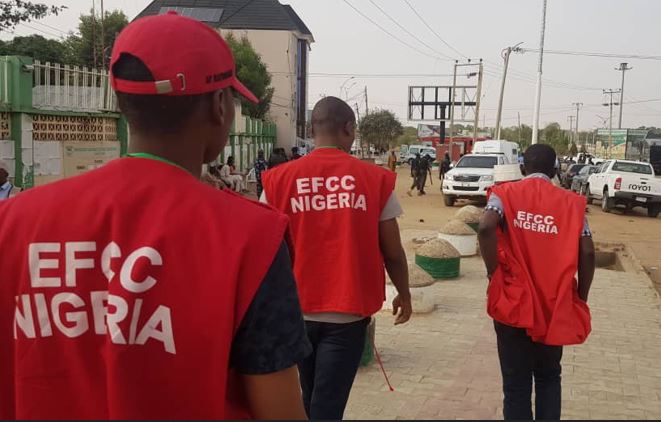
The Economic and Financial Crimes Commission (EFCC) has obtained a court order to freeze 300 accounts, with one account allegedly involved in illegal transactions amounting to $15 billion.
The Chairman of the EFCC, Ola Olukoyede, made this announcement during an interactive session with editors and bureau chiefs in Abuja on Tuesday. He disclosed that the decision to freeze these accounts came after a court order was issued on Monday.
Olukoyede further stated that the EFCC may pursue legal action against 300 individuals engaged in forex racketeering through a peer-to-peer platform, operating outside the boundaries of financial regulations.
He revealed that one of the accounts conducted transactions totaling over $15 billion in the previous year.
Recently, the Federal Government, through the Nigerian Communications Commission, took action to block the online platforms of Binance and other cryptocurrency firms to prevent what it perceived as ongoing manipulation of the forex market and illicit fund transfers.
Additionally, two senior executives of Binance, a cryptocurrency exchange, were detained as part of the government’s efforts to curb speculation on the naira by clamping down on cryptocurrency exchanges.
The government deployed EFCC operatives to apprehend Bureau De Change operators in the bustling Wuse Zone 4 area of Abuja.
Despite the unavailability of websites belonging to major cryptocurrency exchanges like Binance, Coinbase, and Kraken within the country, reports indicate that crypto traders are resorting to alternatives such as Bybit, Bitget, Kucoin, and Coincola, as well as utilizing messaging platforms like Telegram, which features an in-app wallet for transactions.
In emphasizing the measures taken to safeguard the naira and stimulate economic growth, Olukoyede clarified that freezing the forex accounts was aimed at securing the stability of the foreign exchange market and safeguarding the economy. He highlighted that these efforts had positively impacted the value of the naira and the forex market.
Olukoyede underscored the importance of Nigerian citizens’ support for the EFCC, stating that the success of the agency was crucial for the success of Nigeria as a whole.
“Worse than Binance,” remarked Olukoyede. “We ensure adherence to due process in all our actions. It’s worth noting that the ongoing Binance case has significantly curbed the chaos in the forex market.”
“Unexpectedly, we uncovered individuals within the system engaging in activities even more detrimental than those of Binance. They operate under the guise of P2P transactions and similar mechanisms. Just two days ago, we observed a temporary stabilization in the forex market, followed by a sudden devaluation of the naira by N20 to N25. You might have noticed this as well.
“The fluctuation was attributed to the actions of individuals operating on P2P platforms like Coolcoin, some of whom you may have encountered on social media. To illustrate, just yesterday (Monday), we ordered the freezing of over 300 accounts. Shockingly, one account holder had conducted trades totaling over $15 billion last year.”
Continuing, the official highlighted the potential consequences of leaving 300 illicit accounts unchecked, warning of an imminent crash in the naira within the next week if the EFCC had not intervened.
“Our responsibilities are weighty. We dedicate 18 hours a day to our work. While we don’t seek accolades, recognition where due is appreciated. We are as human as any Nigerian citizen.
“The freezing of over 300 accounts involved in illicit forex trading prevented another imminent crash in the coming week. Some individuals seem intent on exacerbating the country’s situation. Collaboration is imperative. The court order to freeze these accounts was crucial. Just imagine the repercussions had we not taken action.”
The EFCC chief emphasized that his agency is also targeting illegal mining, which he described as an economic crime.
Speaking on “illegal miners,” he revealed that EFCC operatives had recently intercepted 40 trucks transporting illegally mined lithium, with a commitment to prosecuting the perpetrators.
He also shed light on ongoing efforts to apprehend former Kogi State Governor, Yahaya Bello, affirming his determination to see the case through to its conclusion.
Olukoyede pledged to resign as EFCC chairman if Bello was not prosecuted, while asserting that he would hold accountable those who obstructed the former governor’s arrest.
The EFCC chairman affirmed that individuals who impeded Bello’s arrest at his Abuja residence would face legal consequences.
He hinted at the potential investigation of incumbent Kogi State Governor, Usman Ododo, for obstructing a lawful operation by assisting his predecessor in evading arrest.
The EFCC is seeking to arraign Bello on 19 counts related to alleged money laundering, breach of trust, and misappropriation of funds totaling N80.2 billion.
Olukoyede emphasized that regardless of opposition or attacks against the anti-graft agency, he and his team remained steadfast in their mission to cleanse the nation.
He disclosed the steps he took after corruption allegations surfaced against Bello.
Olukoyede recounted, “I personally contacted Yahaya Bello, while he was serving as governor, requesting him to visit my office to address the accusations against him. In retrospect, perhaps I shouldn’t have made that call. However, he declined, citing the presence of allegedly over 100 journalists supposedly planted by a certain senator in my office as his reason for refusal.”
“I proposed that he could use my private gate for discretion, but he insisted that my personnel come to his village for interrogation.”
Olukoyede emphasized that the EFCC did not violate any laws in its attempt to arrest the former governor from his residence. “Instead, we have strictly adhered to legal procedures. I inherited this case and did not initiate it. Why has he not subjected himself to the law?” he questioned.
He continued, “I have prosecuted two former governors who are currently out on bail — Willie Obiano and Abdulfatah Ahmed.”
Expanding on the situation, he explained, “We could have apprehended him since January, but we awaited the court order. By 7 am, my team was ready with over 50 personnel. They conducted surveillance and encountered over 30 armed policemen there. Any confrontation could have resulted in gunfire and casualties.”
He pledged to thoroughly investigate and prosecute anyone who has misappropriated public funds. “If I’ve prosecuted individuals like (former Anambra governor) Willie Obiano, (former Kwara governor) Abdulfatah Ahmed, and even Chief Olu Agunloye, who is my kinsman, then why not Yahaya Bello?” Olukoyede questioned.
He disclosed how the former governor withdrew $720,000 from the state’s funds to pay his child’s school fees in advance. “Bello transferred the $720,000 from the state’s account through a Bureau de Change operator,” Olukoyede revealed.
Expressing his disappointment with the former governor for failing to respond to EFCC summonses, he stated, “Knowing he was leaving office, a sitting governor withdrew money directly from the government’s account to a bureau de change to pay his child’s school fees in advance, totaling $720,000.”
He also expressed concern about the activities of internet fraudsters, which he claimed were being supported by certain individuals in Nigeria.
He mentioned that banks across the nation incurred losses of over N8 billion due to internet fraud in 2022.
Furthermore, he stated that more than 71 percent of companies operating in Nigeria fell victim to cybercrime in 2022, emphasizing that the EFCC’s battle against internet fraud is aimed at safeguarding the nation’s future.
Olukoyede revealed that the commission has established a cybercrime research center where convicted internet fraudsters, colloquially known as “Yahoo Yahoo boys,” will undergo training to redirect their expertise towards positive contributions to society.
The EFCC chair also mentioned that the agency is pursuing legal action against two of its operatives for breaching the agency’s code of conduct.
He highlighted the implementation of several reforms to strengthen the agency’s anti-corruption efforts, including the establishment of a directorate focusing on fraud risk assessment/control and ethics/integrity.
Meanwhile, former governor Bello was served with his charges through his legal representative, Abdulwahab Muhammad (SAN), following a ruling by Justice Emeka Nwite of the Federal High Court, Maitama, Abuja. The decision to serve the defendant through his counsel was made as he repeatedly failed to appear before the court.
This information was communicated in a statement released on Tuesday by EFCC spokesperson, Dele Oyewale.
The EFCC is pursuing legal action against Bello, along with Ali Bello, Dauda Suleiman, and Abdulsalam Hudu, on charges totaling 19 counts related to money laundering amounting to N80.2 billion.
Efforts by the commission to apprehend him at his Abuja residence last Wednesday were unsuccessful, as Bello refused to allow EFCC operatives access to his residence or surrender himself, resulting in a prolonged standoff.
Subsequently, he reportedly evaded capture with the alleged assistance of Governor Ododo, who purportedly aided his escape in a vehicle.
Following this incident, the EFCC declared Bello wanted, while the Nigeria Immigration Service placed him on its watchlist.
During the recent court session, Bello’s legal counsel, Adeola Adedipe (SAN), requested the court to dismiss the arrest warrant issued against Bello, arguing that the substituted service to the defendant through Muhammad on Tuesday had nullified the arrest warrant.
Adedipe stated, “The court is obligated to ensure fairness at all times. A warrant of arrest cannot remain active against Bello while we are present in this court. It appears that the defendant will not receive fair treatment since the court issued the arrest warrant before service was made.”
In response, the prosecution counsel, Kemi Piniero (SAN), urged the court to refrain from entertaining any motions from Bello’s legal team until the defendant appears physically in court for arraignment.
“We are currently in the phase of determining the whereabouts of the defendant. He cannot remain in his residence while the trial proceeds without appearing in court to enter his plea. Your Honor, this is a criminal case, not a civil one; he must appear in person to enter his plea.
“This case involves an amount exceeding N80 billion. The defendant’s numerous applications are aimed at avoiding his arraignment and delaying the commencement of the trial,” he stated.
After listening to arguments from both legal teams, Justice Nwite postponed the ruling on the defense’s request to revoke the arrest warrant for Bello until May 10th.



